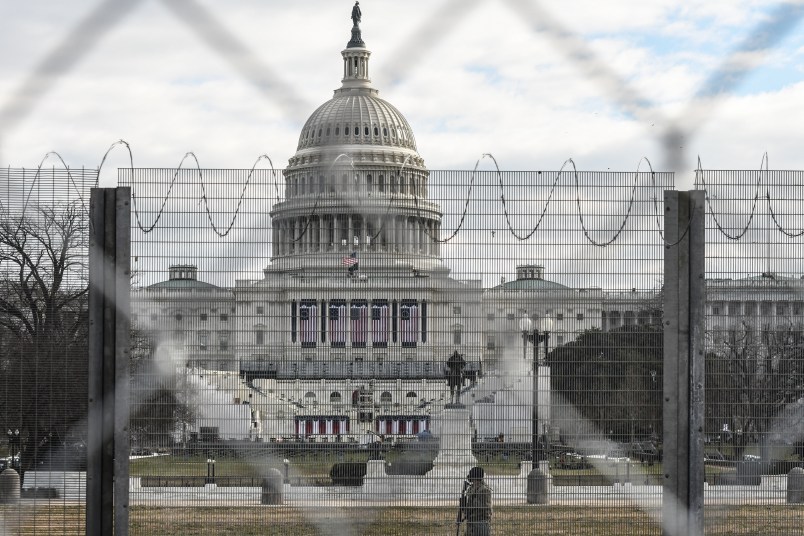As the first batch of President-Elect Joe Biden’s nominees faced their confirmation hearings Tuesday, reminders of the recent Capitol invasion and ransacking loom both inside and outside the building.
And it was clearly on the minds of the nominees and Democratic members, particularly during the hearings for critical national security positions. The nominees for those positions, Alejandro Mayorkas for Department of Homeland Security secretary and Avril Haines for Director of National Intelligence, took on a battery of questions about the growing threat of violent, right-wing groups that have unified to support President Donald Trump.
“The love for this country that I learned from my parents made the January 6 attack on the Capitol all the more horrifying,” Mayorkas said in his opening statement.
“We still have much to learn about what happened that day and what led up to the insurrection,” he continued. “If I should have the honor of being confirmed, I will do everything I can to ensure that the tragic loss of life, the assault on law enforcement, the desecration of the building that stands as one of the three pillars of our democracy, and the terror felt by you, your colleagues, staff, and everyone present, will not happen again.”
Concern about the attack, and, more broadly, the rise in domestic terrorism particularly from white supremacists, provided the framework for some Democratic questioning in the DHS hearing. Republican members tended to focus more narrowly on immigration and cybersecurity issues.
Ranking member Sen. Gary Peters (D-MI) said that he’d often been met with “resistance” in his efforts “to investigate white supremacist violence and threats,” asking Maryorkas how he’d retrain the department’s focus.
“We have seen the disturbing and alarming rise in domestic terrorism throughout the country, culminating of course with the violent attack on the U.S. Capitol 13 days ago,” said Sen. Maggie Hassan (D-NH), pushing a terrorism information-sharing commission. A breakdown in communications — particularly around what the FBI shared or did not share with local police forces in D.C. — has become a point of contention and scrutiny in the reckoning after the insurrection.
Sen. Jacky Rosen (D-NV) used the invasion to tee up a question about combatting domestic terrorism motivated by anti-Semitism.
“Just this month, we saw American citizens lay siege to the U.S. Capitol waving Confederate flags, hanging a noose on the west front lawn and wearing ‘Camp Auschwitz’ t-shirts,” she said.
There were similar themes over in the hearing for Director of National Intelligence nominee Avril Haines, despite the fact that the agency is further removed from issues of domestic terrorism.
Haines called the insurrection “truly disturbing,” though she added that the FBI and DHS are the point organizations to handle U.S.-based threats.
She also promised a public assessment on the threat from QAnon, a conspiracy theory that has enveloped many of the pro-Trump communities behind the Capitol mob.
Sen. Mark Warner (D-VA), the ranking member, made a point of identifying terrorism as a growing threat. He somewhat surprisingly listed Antifa as a “violent extremist group,” given that it’s less of an organization than a philosophy that the Trump administration has sought to demonize.
“Terrorism remains a real and major threat, especially as violent extremist groups whether, Islamist, Antifa, or white nationalism, are increasingly mutating, fracturing, regrouping, and radicalizing on the Internet and social media,” he said.
The heavy presence of the insurrection in the questioning connects to the heightened desire to have leaders of the departments that handle national security confirmed quickly. Currently, as the nominees answer questions, the city they’re in is flooded with National Guard troops and criss-crossed with barricades and fencing. Its entry points are heavily monitored, and much of the public transportation into the city has been stopped.
On Wednesday, Washington D.C. will host an inauguration already unlike any that’s gone before, simply due to the COVID-19 pandemic. But after January 6, the country — including these lawmakers and nominees — will be holding its breath to see if more pro-Trump violence breaks out.



